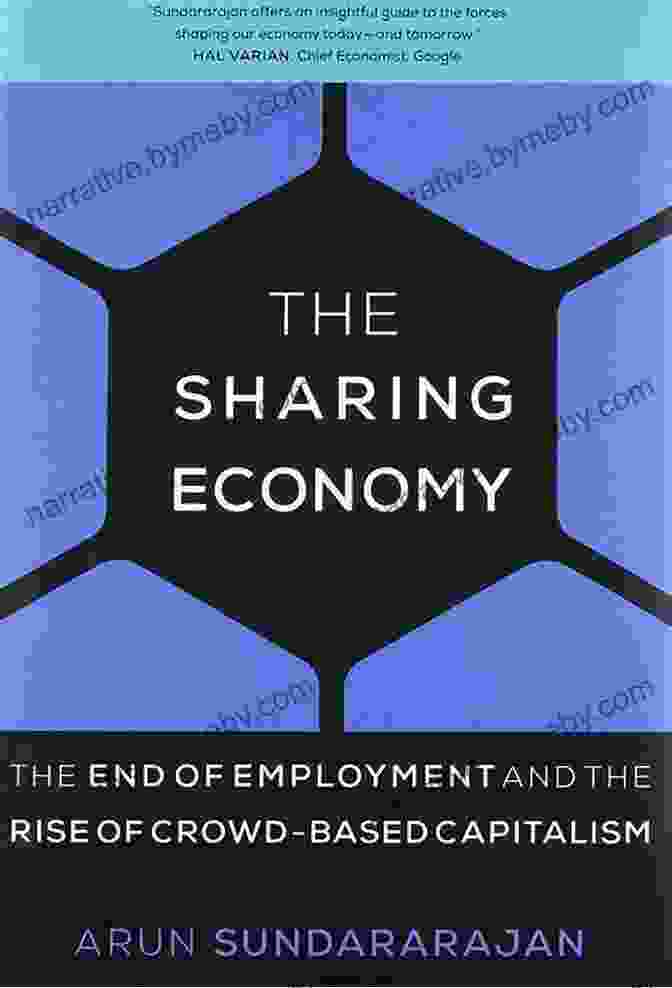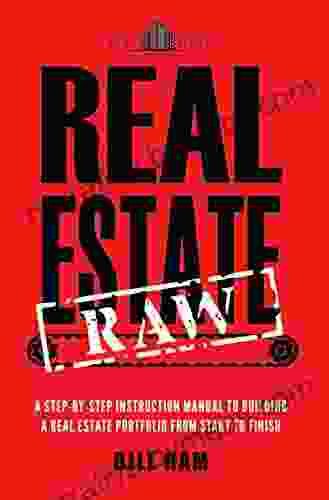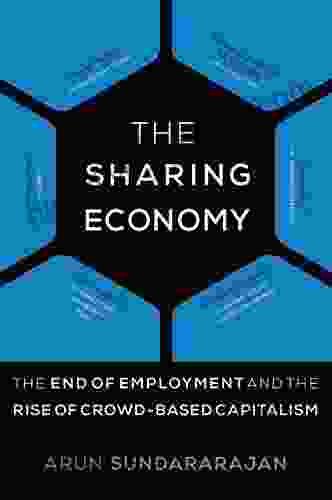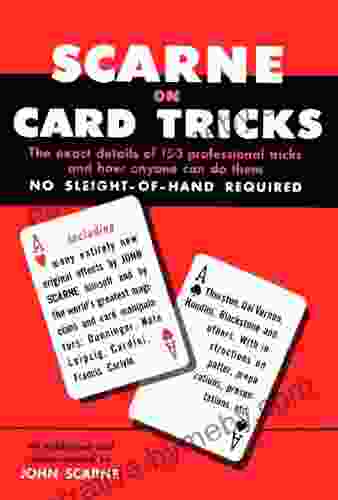The End of Employment and the Rise of Crowd-Based Capitalism: A Revolutionary Transformation

Embracing the Future of Work in the Era of the Digital Revolution

In an ever-evolving technological landscape, the traditional notions of work and employment are undergoing a profound transformation. The rise of crowd-based capitalism is reshaping the workforce, creating unprecedented opportunities and challenges for individuals, businesses, and society at large. "The End of Employment and the Rise of Crowd-Based Capitalism" delves into this transformative landscape, providing a comprehensive analysis of the forces driving this shift and its profound implications for our future.
4.2 out of 5
| Language | : | English |
| File size | : | 2426 KB |
| Text-to-Speech | : | Enabled |
| Screen Reader | : | Supported |
| Enhanced typesetting | : | Enabled |
| Word Wise | : | Enabled |
| Print length | : | 306 pages |
The Decline of Traditional Employment
The traditional model of employment, based on long-term, full-time jobs with fixed salaries and benefits, is rapidly eroding. The proliferation of automation, artificial intelligence, and robotics is displacing workers in numerous industries. Freelancing, gig work, and platform-based employment are becoming increasingly prevalent, offering flexibility and autonomy but often lacking the stability and security associated with traditional employment.
Emergence of Crowd-Based Capitalism
Crowd-based capitalism leverages the power of crowds to create and deliver goods and services. This decentralized and distributed model enables individuals to participate in the workforce without traditional employment relationships. Online platforms and marketplaces connect workers with a diverse range of tasks, enabling them to contribute their skills and knowledge to projects and organizations worldwide.
Benefits of Crowd-Based Capitalism
- Increased Flexibility and Autonomy: Crowd-based capitalism offers individuals greater control over their work schedules and responsibilities, allowing them to balance work and personal life more effectively.
- Access to a Global Labor Pool: Platforms and marketplaces connect workers from around the world, providing access to a vast pool of talent for businesses and organizations.
- Lower Labor Costs: For businesses, crowd-based capitalism can reduce labor costs by eliminating the need for full-time staff and traditional benefits packages.
- Innovation and Creativity: Crowd-based models foster collaboration and idea-sharing, encouraging innovation and creativity among workers.
Challenges of Crowd-Based Capitalism
- Job Insecurity and Precarious Work: Crowd-based work often involves short-term contracts, irregular income, and a lack of traditional benefits, leading to job insecurity and precarious working conditions for many participants.
- Platform Dependency: Workers rely heavily on platforms and marketplaces to find work and manage their activities, creating concerns about platform dominance and potential exploitation.
- Skills Gap: Crowd-based capitalism requires workers to adapt to new technologies and evolving job demands, highlighting the need for continuous learning and skill development.
Implications for the Future of Work
The rise of crowd-based capitalism has profound implications for the future of work, requiring a fundamental shift in our understanding and approach:
- Redefining Work and Employment: The traditional definition of work and employment is challenged, as crowd-based models offer alternative ways of earning a living and contributing to the economy.
- Upskilling and Continuous Learning: Workers need to acquire new skills and adapt to the evolving workforce, embracing lifelong learning and continuous professional development.
- Social Policy and Labor Regulation: Governments and policymakers must adapt social policies and labor regulations to support workers in the crowd-based economy, addressing issues such as job insecurity and platform accountability.
The "End of Employment and the Rise of Crowd-Based Capitalism" provides a comprehensive examination of the transformative forces shaping the future of work. By embracing the opportunities and navigating the challenges associated with this paradigm shift, individuals, businesses, and societies can unlock the potential of crowd-based capitalism. This book serves as an essential guide for understanding and preparing for the future of employment in the digital age.
4.2 out of 5
| Language | : | English |
| File size | : | 2426 KB |
| Text-to-Speech | : | Enabled |
| Screen Reader | : | Supported |
| Enhanced typesetting | : | Enabled |
| Word Wise | : | Enabled |
| Print length | : | 306 pages |
Do you want to contribute by writing guest posts on this blog?
Please contact us and send us a resume of previous articles that you have written.
 Book
Book Novel
Novel Page
Page Chapter
Chapter Text
Text Story
Story Genre
Genre Reader
Reader Library
Library Paperback
Paperback E-book
E-book Magazine
Magazine Newspaper
Newspaper Paragraph
Paragraph Sentence
Sentence Bookmark
Bookmark Shelf
Shelf Glossary
Glossary Bibliography
Bibliography Foreword
Foreword Preface
Preface Synopsis
Synopsis Annotation
Annotation Footnote
Footnote Manuscript
Manuscript Scroll
Scroll Codex
Codex Tome
Tome Bestseller
Bestseller Classics
Classics Library card
Library card Narrative
Narrative Biography
Biography Autobiography
Autobiography Memoir
Memoir Reference
Reference Encyclopedia
Encyclopedia Atul K Mehra
Atul K Mehra Jane M Healy
Jane M Healy Barrington Barber
Barrington Barber Barry Brown
Barry Brown Rick J Scavetta
Rick J Scavetta Charles Neider
Charles Neider B A Shapiro
B A Shapiro Ascencia Pharmacy Technician Exam Prep Team
Ascencia Pharmacy Technician Exam Prep Team Barry Eisler
Barry Eisler Barry Diggens
Barry Diggens Kevin Easley
Kevin Easley Ciara Attwell
Ciara Attwell Kevin Hancock
Kevin Hancock T A Williams
T A Williams John Edgar Wideman
John Edgar Wideman Mike Tyson
Mike Tyson Avery Carl
Avery Carl Ashley Spires
Ashley Spires Hwee Hua Lim
Hwee Hua Lim John W F Dulles
John W F Dulles
Light bulbAdvertise smarter! Our strategic ad space ensures maximum exposure. Reserve your spot today!

 William WordsworthArthurian Legendarians: Faithless One - Part One – A Journey into the Heart...
William WordsworthArthurian Legendarians: Faithless One - Part One – A Journey into the Heart...
 Donovan CarterExplore the Majestic Himalayas: A Captivating Journey with "No Friend But the...
Donovan CarterExplore the Majestic Himalayas: A Captivating Journey with "No Friend But the... Patrick HayesFollow ·13.6k
Patrick HayesFollow ·13.6k Theodore MitchellFollow ·7.3k
Theodore MitchellFollow ·7.3k Casey BellFollow ·9.2k
Casey BellFollow ·9.2k Mark TwainFollow ·10.5k
Mark TwainFollow ·10.5k Edward BellFollow ·5.6k
Edward BellFollow ·5.6k Cortez ReedFollow ·11.4k
Cortez ReedFollow ·11.4k Gene SimmonsFollow ·13.4k
Gene SimmonsFollow ·13.4k Nathan ReedFollow ·3.6k
Nathan ReedFollow ·3.6k

 Ian McEwan
Ian McEwanWhy Didn't Anyone Say Anything? Uncovering the Hidden...
By [Author's...

 William Wordsworth
William WordsworthArthurian Legendarians: Faithless One - Part One – A...
In the realm of legendary tales, the...

 Corey Hayes
Corey HayesSSAT ISEE Prep Test: Arithmetic Review Flash Cards Cram...
Are you preparing for the SSAT or ISEE exam?...

 Robert Louis Stevenson
Robert Louis StevensonUnveiling the Essential Guide to Compliance: BCBS 239...
In the ever-evolving...

 Javier Bell
Javier BellJust Peachy: A Tale of Sweetness and Sassiness
Immerse yourself in a...

 Brent Foster
Brent FosterStep-by-Step Instruction Manual to Building a Real Estate...
Are you eager to embark on the...
4.2 out of 5
| Language | : | English |
| File size | : | 2426 KB |
| Text-to-Speech | : | Enabled |
| Screen Reader | : | Supported |
| Enhanced typesetting | : | Enabled |
| Word Wise | : | Enabled |
| Print length | : | 306 pages |








